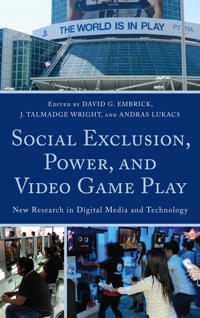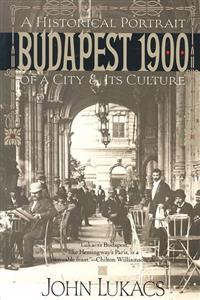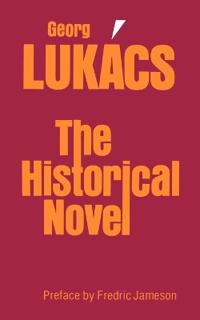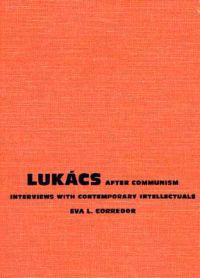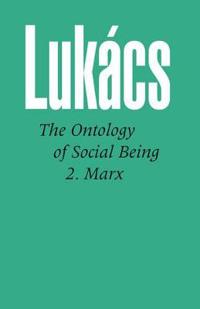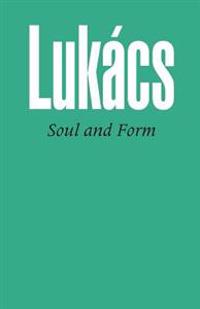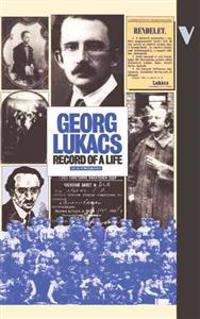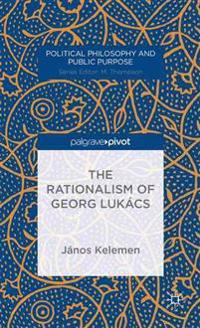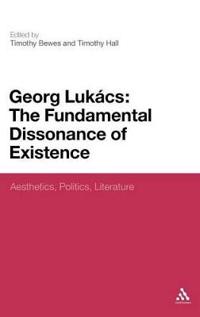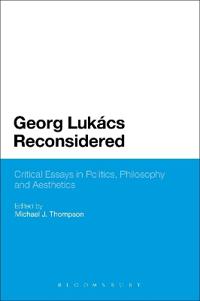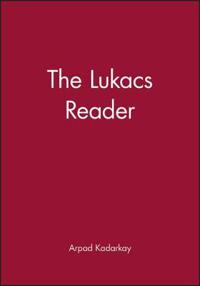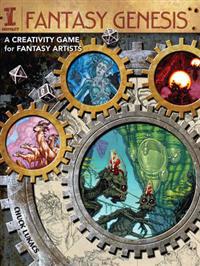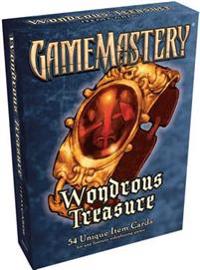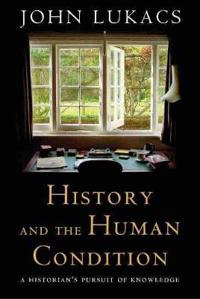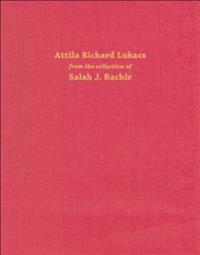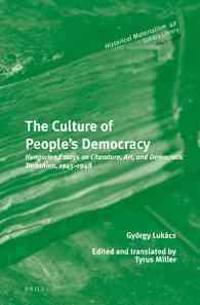Social Exclusion, Power, and Video Game Play (Inbunden)
avJ. Talmadge Wright, Andras Lukacs
ISBN: 9780739138601 - UTGIVEN: 201203While many books and articles are emerging on the new area of game studies and the application of computer games to learning, therapeutic, military, and entertainment environments, few have attempted to contextualize the importance of virtual play within a broader social, cultural, and political env[...]
Budapest 1900 (Häftad)
avLukacs
ISBN: 9780802132505 - UTGIVEN: 1994-02"Lukacs's book is a lyrical, sometimes dazzling, never merely nostalgic evocation of a glorious period in the city's history. . . . {His} true sympathy lies . . . not with the famous expatriates, but with the writers and intellectuals who lived and died at home: the poets Endre Ady and Mihaly Babits[...]
The Historical Novel (Pocket)
avGeorg Lukacs
ISBN: 9780803279100 - UTGIVEN: 1983-04Georg Lukacs (1885-1971) is now recognized as one of the most innovative and best-informed literary critics of the twentieth century. Trained in the German philosophic tradition of Kant, Hegel, and Marx, he escaped Nazi persecution by fleeing to the Soviet Union in 1933. There he faced a new set of [...]
Lukacs After Communism (Pocket)
avEva L. Corredor, Stanley Eugene (EDT) Fish, Fredric (EDT) Jameson
ISBN: 9780822317630 - UTGIVEN: 1997-04Since the collapse of communism in Eastern Europe, the validity of Marxism and Marxist theory has undergone intense scrutiny both within and outside the academy. In "Lukacs After Communism", Eva L. Corredor conducts ten lively and engaging interviews with a diverse group of international scholars to[...]
Ontology of Social Being (Pocket)
avGeorg Lukacs
ISBN: 9780850362275 - UTGIVEN: 1980-06A study of essential philosophical categories in Marxism.
Record of a Life (Pocket)
avGeorg Lukacs
ISBN: 9780860917717 - UTGIVEN: 1985-07This revealing autobiography of the Hungarian Marxist philosopher Georg Lukacs is centered on a series of interviews that he gave in 1969 and 1971, shortly before his death on 4 June 1971. Stimulated by the sympathetic yet incisive questioning of the interviewer, the Hungarian essayist Istvan Eorsi,[...]
The Rationalism of Georg Lukacs (Inbunden)
avJanos Kelemen
ISBN: 9781137372819 - UTGIVEN: 2013-11This work explores two lesser known aspects of Georg Lukacs's thought: his conception of language and theory of science, and his achievements in literary history. This book defends Lukacs's concept of rationality and presents an original argument demonstrating that there are good reasons for choosin[...]
Georg Lukacs: The Fundamental Dissonance of Existence: Aesthetics, Politics, Literature (Inbunden)
avTimothy Bewes, Timothy Hall, Timothy Bewes
ISBN: 9781441157904 - UTGIVEN: 2011-03>
Georg Lukacs Reconsidered (Pocket)
avMichael J. (EDT) Thompson
ISBN: 9781441166944 - UTGIVEN: 2013-02Georg Luk cs stands as a towering figure in the areas of critical theory, literary criticism, aesthetics, ethical theory and the philosophy of Marxism and German Idealism. Yet, despite his influence throughout the twentieth century, his contributions to the humanities and theoretical social sciences[...]
The Lukacs Reader
ISBN: 9781557865717 - UTGIVEN: 1995-09One of the greatest Marxist theorists of his generation, Georg Lukacs was a prolific writer of remarkably catholic, if moralistic, tastes. In The Lukacs Reader , his biographer Arpad Kadarkay represents the great range and variety of Lukacsa s output. The reader includes, in original translations, [...]
Fantasy Genesis (Pocket)
avChuck Lukacs
ISBN: 9781600613371 - UTGIVEN: 2010-03Get Rolling on Your Most Inventive Artwork Ever! What lurks in the shadows of your imagination? This book takes you deep into the dusty corners and dark recesses where your most original ideas lie in wait, showing you how to lure them out into daylight, and shape them into fantastic yet believable [...]
Gamemastery Item Cards: Wondrous Treasure (Övrigt)
avChuck Lukacs, Paizo Publishing, Paizo Publishing
ISBN: 9781601251466 - UTGIVEN: 2009-04History and the Human Condition (Inbunden)
avJohn Lukacs
ISBN: 9781610170659 - UTGIVEN: 2013-02"This is the best introduction to the historical craft of John Lukacs . . . one of the true creative geniuses of his profession." --"The American Conservative" In a career spanning more than sixty-five years, John Lukacs has established himself as one of our most accomplished historians. Now, in the[...]
Lenin (Häftad)
avGeorg Lukacs
ISBN: 9781844673520 - UTGIVEN: 2009-05The book Lenin: A Study in the Unity of His Thought is the product of an unprecedented, and unrepeatable, conjuncture. Written immediately after Lenin's death in 1924, and thus on the cusp of a period of bureaucratic reaction in the Communist movement, it consists of the reflections of the most impo[...]
A Defence of History and Class Consciousness (Häftad)
avGeorg Lukacs
ISBN: 9781859843703 - UTGIVEN: 2002-06Lukacs's masterpiece History and Class Consciousness (1923) is commonly held to be the foundational text for the tradition known as Western Marxism. As Stalinism took over, Lukacs was subjected to attacks for deviations from the party line. In the mid 1920's Lukacs wrote a passionate response to thi[...]
Attila Richard Lukacs: From the Collection of Salah J. Bachir
ISBN: 9781907804533 - UTGIVEN: 2014-08Vancouver-based artist Attila Richard Lukacs catapulted to international attention in the early 1990s with his monumental, sexually charged canvases drawing on the traditions of European history painting. This major publication includes many of the artis's most well-known paintings, Polaroids, and c[...]
Lukacs's Phenomenology of Capitalism
ISBN: 9783319932866 - UTGIVEN: 2018-08This book offers a radical new interpretation of Georg Lukacs's History and Class Consciousness, showing for the first time how the philosophical framework for his analysis of society was laid in the drafts of a philosophy of art that he planned but never completed before he converted to Marxism. Re[...]
The Culture of People's Democracy: Hungarian Essays on Literature, Art, and Democratic Transition, 1945-1948 (Inbunden)
avGyorgy Lukacs, Tyrus Miller
ISBN: 9789004217270 - UTGIVEN: 2013-06When the Hungarian Marxist philosopher and literary critic Gy rgy Luk cs returned to Hungary from Moscow after World War II, he engaged in a highly active phase of writing and speaking about the democratic culture needed to exorcise the remnants of fascism and to create the conditions for the advanc[...]

